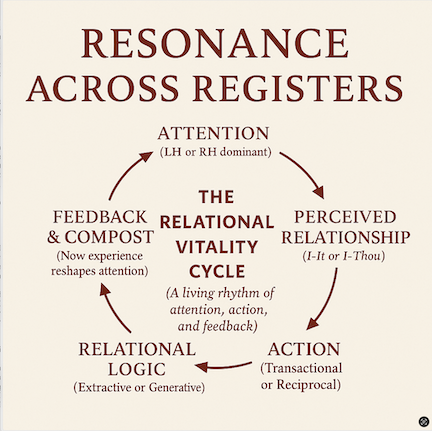Why vitality, integrity, and responsibility must move together if we are to lead from Horizon 2.
This post introduces a companion framework to the paper, “Secular Leadership and Spiritual Responsibility”, offering a relational foundation for transformational leadership.
From Principle to Practice: Three Invitations for Relational Leadership
When we speak of Ecologies of Hope, we are not speaking of abstract ideals or technical blueprints. We are speaking of how human energy moves—how attention becomes action, how systems shape and are shaped by us, and how meaning is metabolised in relationship.
At the heart of this shift lies a deceptively simple insight: transformation is not only political or technical—it is cultural, emotional, and spiritual. If Horizon 2 is the messy middle between inherited systems (H1) and regenerative futures (H3), then the work of leadership must also change. Horizon 2 is where relational maturity becomes leadership.
But how do we lead from this place?
We offer here three interconnected invitations—each one a thread, and together a weave:
1. The Principle of Relational Integrity: A Guiding Light
This principle affirms that life is inherently relational—a web of mutual becoming, not isolated achievement. Sustainability, meaning, and governance all depend on this truth. To act with relational integrity is to live into a reality where “separation” is illusion and care is foundational. It is not a rule, but a compass.
2. The Relational Responsibility Manifesto: An Ethical Framework
Principles inspire, but we also need orientation. The Manifesto sets out eight commitments—not as commandments, but as ethical dispositions. It reminds us that relational work spans systems thinking, emotional literacy, cultural storytelling, and deep listening. It moves through governance, education, and economics—not as overlays, but as spaces of stewardship.
3. The Relational Vitality Cycle: A Lived Pattern
Finally, we offer a practical rhythm. The Relational Vitality Cycle (previously called the Relational Krebs Cycle) illustrates how our attention, perception, actions, and feedback shape one another. It invites us to notice the spiritual not in belief, but in how we attend, relate, and respond. In other words, how we live.

Leadership, then, becomes less about vision and more about vibration. It becomes not what we build, but how we relate.
From Roof to Root
The Principle is the rooftop star—the orientation by which we navigate.
The Manifesto is the scaffolding—the structure that holds our commitments.
The Cycle is the soil—the metabolic process of living it daily.
Together, they offer a whole-system invitation: to think with complexity, feel with integrity, and act with courage. They’re not a doctrine. They’re a dance.
To explore and discuss with others, we invite you to download the combined resource as a PDF:
📄 Download the full Relational Leadership Toolkit (PDF)
Terry Cooke-Davies
26th April 2025







This is great stuff Terry, thank you… Just sent you a request to connect on Linkedin and looking forward to perusing the PDF…